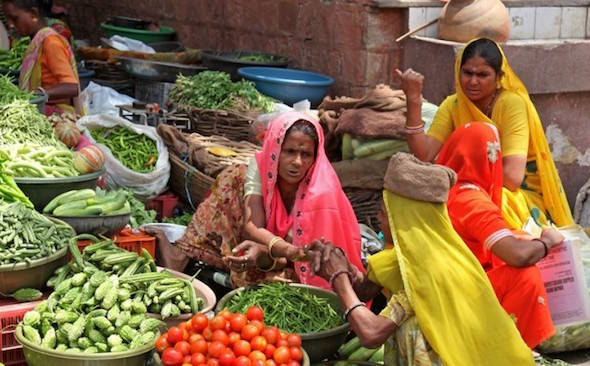Lower Fruit and Vegetable Yields Would Threaten Millions of People
As many governments seek to promote healthy diets, scientists warn that climate-related reductions in fruit and vegetable production could have deadly consequences.
By Tim Radford / Climate News Network

Women selling fruit and vegetables at a market in Jaipur, India. (Chris Brown via Flickr)
This piece first appeared at Climate News Network.
LONDON — Climate change could bring about more than 500,000 extra adult deaths a year by 2050 — simply by reducing the supply of fruit and vegetables available to millions.
Although restricted food production could reduce health risks linked to the growing epidemic of obesity worldwide, any such benefits will be wiped away by the greater toll of undernourishment, according to new research that says three out of four of those extra deaths could happen in China and India.
Marco Springmann, post-doctoral researcher in population health at the Oxford Martin Programme on the Future of Food at Oxford University, UK, and colleagues report in The Lancet that their study of the impact of climate change on diet and bodyweight is the first of its kind, and the first to estimate the possible number of deaths in 155 countries.
“Much research has looked at food security, but little has focused on the wider health effects of agricultural production,” Dr Springmann says.
“Changes in food availability and intake also affect dietary and weight-related risk factors, such as low fruit and vegetable intake, high red meat consumption, and high bodyweight. These all increase the incidence of non-communicable diseases such as heart disease, stroke and cancer, as well as death from those diseases.
Energy content
“Our results show that even modest reductions in the availability of food per person could lead to changes in the energy content and composition of diets, and these changes will have major consequences for health.”
The research — as such studies so often do — assumes that not enough will be done to reduce global emissions.
At the Paris climate conference last December, 195 nations agreed on concerted and sustained steps to reduce greenhouse gas emissions from fossil fuel combustion, in an attempt to contain global warming to well within a 2°C rise above the levels in which human civilisation evolved.
Most nations have yet to act on their promises, or to sustain such action, and climate scientists have repeatedly warned that those already-promised steps may still not be enough. So such warnings tend to be based on the notorious “business as usual” scenario.
And there have been plenty of warnings. In the last three years, researchers have warned that higher temperatures could encourage the spread of specific mosquito-borne infection and also a general rise in insect pests and diseases.
They have also addressed the health challenges of fossil fuel combustion as a source of pollution and raised the alarm about deaths from heat extremes that are likely to be greater than any reductions in premature deaths because of warmer winters.
“Climate change is likely to have
a substantial negative impact on future mortality,
even under optimistic scenarios”
And they have considered climate change as a problem of food security, with implications for human health, and as threat to vital sources of protein.
In the same week as The Lancet paper, a team led by Barry Levy, adjunct professor of public health at Tufts University in the US, warns in the Annals of Global Health journal that a public health crisis is in the making.
“Adverse health effects caused by climate change include heat-related disorders, vector-borne diseases, food-borne and water-borne disease, respiratory and allergic disorders, malnutrition, collective violence, and mental health problems,” their paper says.
And, the scientists point out, people in the poorest countries — who emit only a tenth of the emissions released per capita in Australia, the US and Canada — will be the ones likely to suffer most.
What distinguishes The Lancet study is its embrace, and precision. The Oxford researchers suggest that — unless action is taken to reduce global emissions — climate change could cut the projected improvement in food supply by about one-third by 2050.
This would mean an average reduction of available food per person by 3.2%, or 99 kilocalories a day. Fruit and vegetable intake would be down by 4% (14.9 grams a day) and red meat would fall by 0.7% or 0.5 gram a day.
Nutrition-related deaths
The researchers then calculated the potential health gains from a reduction in red meat consumption, and set them against the costs of a fall in fruit and vegetable intake.
This shortfall would mean, for those nations with the greatest numbers of poorer people, a higher rate of nutrition-related deaths. By 2050, this toll would have risen to 529,000 extra deaths that year.
In contrast, they suggest, in some notional future without climate change, the conjectured increases in food production could have prevented 1.9 million premature deaths.
And although most projected deaths will happen in the Western Pacific and Southeast Asia (with 248,000 in China and 136,000 in India alone), even countries such as Greece and Italy will see significantly losses.
“Climate change is likely to have a substantial negative impact on future mortality, even under optimistic scenarios,” Dr Springmann says.
“Adaptation efforts need to be scaled up rapidly. Public health programmes aimed at preventing and treating diet and weight-related risk factors, such as increasing fruit and vegetable intake, must be strengthened as a matter of priority to help mitigate climate-related health effects.”
Tim Radford, a founding editor of Climate News Network, worked for The Guardian for 32 years, for most of that time as science editor. He has been covering climate change since 1988.
Your support matters…Independent journalism is under threat and overshadowed by heavily funded mainstream media.
You can help level the playing field. Become a member.
Your tax-deductible contribution keeps us digging beneath the headlines to give you thought-provoking, investigative reporting and analysis that unearths what's really happening- without compromise.
Give today to support our courageous, independent journalists.






You need to be a supporter to comment.
There are currently no responses to this article.
Be the first to respond.